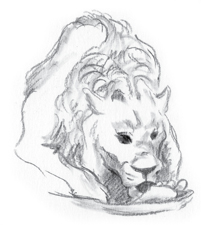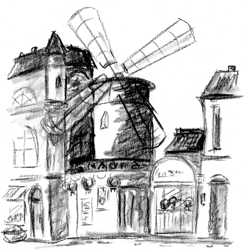Mira's Diary (8 page)
Authors: Marissa Moss

“Are you a friend of Mom's or not? You tell me what she wants, then tell me to ignore it. And I'm supposed to trust you?”
“Don't trust me! I don't care! I did what I said I would and that's it! Sometimes I think your mother is crazy. Sometimes I know she is!” Morton stood up, wiping his sweaty face with a large lavender handkerchief. “Good day, mademoiselle!” He stuffed the kerchief back in his pocket and hurried off.
I wanted to chase after him. He was the only link I had to Mom. But was he a good link or a bad one? I had no idea. What if everything he had said was a complete lie? Did Mom really care about Dreyfus that much? Was his life the change she meant?
I could assume that much was true because of her letter, but did she really expect me to sneak into an embassy office? Was I supposed to knock out the cleaning woman and take her place? That sounded like the kind of thing that would happen in a spy movie. But was it something I could do? And could I get to 1894 to do it?
Or was this whole thing a setup by Morton? Was he an evil time-traveler like the beautiful creepy woman? I didn't think he'd be so scared of her if they were on the same side, but I wasn't sure who or what to believe.

Over tea with Claude, Degas chatted about his favorite jockeys, the dancers he'd draw tomorrow, and one particular one that he was recommending Halévy find a position for in the musical theatre. He was so cheerful that I stopped thinking about the crumbling of the French government and how I was supposed to stop it somehow.
“Monsieur Degas,” I said. “I was surprised to see you sketch at the races! I never see you paint outside like Monsieur Monet.” It was easier to talk about art than why he should like Jews more. I couldn't quite get myself to do that.

“Ah, well, drawing a quick sketch is one thing. Painting is another. You know how I feel about that! If I were the government, I'd have a special brigade of police to protect the public from artists who paint landscapes outside from nature. They don't have to arrest anyone, but a little bird-shot now and then as a warning would be effective.”
“Those are your friends you're talking about!”
“I respect Monet, but he's no friend. Now Manet and Renoir, they are true friends, so I forgive them their follies.”
“And Claude? He was drawing outside too. And he's Jewish, so how about him?” Ugh, that was clumsy. I was practically asking Degas if he was ready to round up Jews and shove them all into a locked ghetto.
“Claude is Jewish?” Degas raised an eyebrow. “I did not know that. Should I reconsider his position here?”
“No, of course not!” What a mess I was making! Was I getting Claude fired? I shot him a panicked look. Would he ever forgive me? “I thought you didn't care he was Jewish. After all, the Halévy family is Jewish.”
“The Halévys
were
Jewish,” Degas corrected me. “They are good Christians now. You can hardly fault them for their ancestry. Well, actually, I suppose one could but I, for one, do not.”
“Monsieur Degas is teasing you, Mira,” Claude said. “He knows perfectly well that I am a Jew. What matters is whether I can draw, and that is something I am still struggling with. And you are an artist yourself, no matter how much you protest. I've seen you drawing in your sketchbook.”
I could feel my cheeks turn bright pink. “I told you, those were just notes,” I stammered. “I admit I like to draw, but I'm not an artist.” Not on the same level as Claude. And certainly not Degas. I would never show either of them my clumsy scrawls. It would be easier to talk about Judaism than that!
Anyway, Degas was tolerant enough with Jews, and nothing I said made a difference one way or another. If he wanted to support Dreyfus, he would. If he didn't, he wouldn't. I suppose that meant I should think about the second task Mom had given me, at least according to Morton, but that would mean finding a touchstone that would somehow get me to 1894.
Claude walked me home after Degas left for the theater. It all felt so normal that I almost forgot I didn't belong in this time or place. It was easier to think about Claude than time travel and urgent secret missions. Neither of us said anything, but it was a comfortable silence, the kind that holds you like a soft blanket.
“Let's walk through the
jardin
,” Claude suggested. “Paris has a lot of fountains, but my favorite is in here.” He steered me through the paths lined with rosebushes to an impressive but strange fountain. In front of the spouts of water crouched a sculpture of a lion eating someone's foot.
“I like the lion but why is it devouring a foot?” I asked.
Claude shrugged. “I think that is meant to be naturalistic.”
“It seems anything but natural to me!”
“You don't like it?” Claude sounded disappointed.
“Of course I do! I love it! Thank you for showing it to me.”
“Perhaps you want to add it to your collection,” he suggested.
“What do you mean? My collection of what?”
“Drawings. Go ahead and sketch it. I won't look.” Something soft in his face and voice encouraged me. And he was right. My fingers were itching to draw it. I had thought I'd sketch it from my memory, later alone in my room, the way I usually did, but now the temptation was too great. I opened my sketchbook and started to draw.

Claude kept his word and didn't look, but he was so sweet and patient, waiting for me to finish, that I did something I never thought I'd do. I showed him the drawing.
“Mira, this is wonderful! You have such an expressive line, so full of life! And you said you were not an artist.” Claude looked up from the page, gazing directly into my eyes.
“It's nothing, really,” I murmured, embarrassed.
“No, it is a definite something. You have a real talent, you know. Thank you so much for letting me see this.”
Something shifted between us at that moment. We hadn't kissed, hadn't even held hands, but there was an intimacy between us, as soft and warm and welcoming as I'd imagined a kiss could be.
“There is something else I would like to show you,” Claude said, his voice hushed and low.
“Yes?” My voice quavered.
“I⦔ he leaned forward, his gaze intent on mine.
“Yes?” I remembered how his lips felt on my wrist.
He leaned closer still and I tipped my lips up to meet his. He stepped forward and I don't know why, but I stumbled, bumping into the lion. A jolt went through me, my stomach lurched, my eyes glazed over, and the park whirled around me in greens, golds, blues, and browns. Suns rose and set rapidly, and when the ground stopped tilting, I was still in the park but Claude was gone. I must have found my touchstoneâat the absolute worst minute. When I definitely wasn't looking for it at all.

Winter?
It was cold, the grass rimed with frost, and my dress far too thin for the biting chill. I didn't see any cars or satellite dishes so it wasn't 2012. I was still in the past. I walked toward Mary Cassatt's apartment, and everything seemed much the same as in 1881.

The same but not the same. The little grocery store Claude and I had just passed was now a butcher shop. But the newsstand was still there, and so were the bakery and the music hall with the lanterns hanging outside.
The hats in the milliner's window were similar, the dresses and shoes in familiar styles, so not enough time had passed for fashion to change. A playbill announced the opera
Carmen
, music by Georges Bizet, libretto by Ludovic Halévy. Halevy, Degas's friend! So still the 1880s, I bet. Then I noticed the date on the poster, January 1895! Mom wanted me to go to 1894. I'd skipped past when I was supposed to go. But I hadn't meant to time-travel at all. I had no control on how to make it work. What was I supposed to do now that I was here?

I walked aimlessly in a daze. All I wanted was to be back with my family in the right place at the right time. How could I trust I would ever have a future when time kept changing around me? I felt totally lost.
The streets grew more crowded, and I found myself jostled by children running and yelling, men rushing, even women joining the throng. Everyone was heading in the same direction. I tried to read from people's expressions what was happening. Some looked furious, others excited. Some had a strange look I couldn't quite place. Almost like happiness but with a nasty edge to it. A whirlpool of people swirled around me, pushing, pulling, shoving. What was going on?
I stopped one woman who looked eager, like she was rushing to some kind of big giveaway at a store opening. I held on to her sleeve, forcing her to answer me when I asked in faltering French where she was going.
“To the Military College, of course! Everyone wants to be there!” Her eyes moist with excitement, she pulled away and ran off before I could ask why anyone would care about a military academy. So I followed the hordes. I really didn't have a choice anyway. Waves of shoulders and arms carried me along. I couldn't have thrust my way across or through them even if I'd wanted to. I tried not to panic, nearly crushed by the bodies around me. A boot stomped on my dress, tearing the hem. An elbow thrust into my ribs.
The crowd got thicker and meaner as we neared a familiar spire. It was the Eiffel Tower! It gleamed shiny and new in the winter light. Maybe that was what everyone was so excited about.
